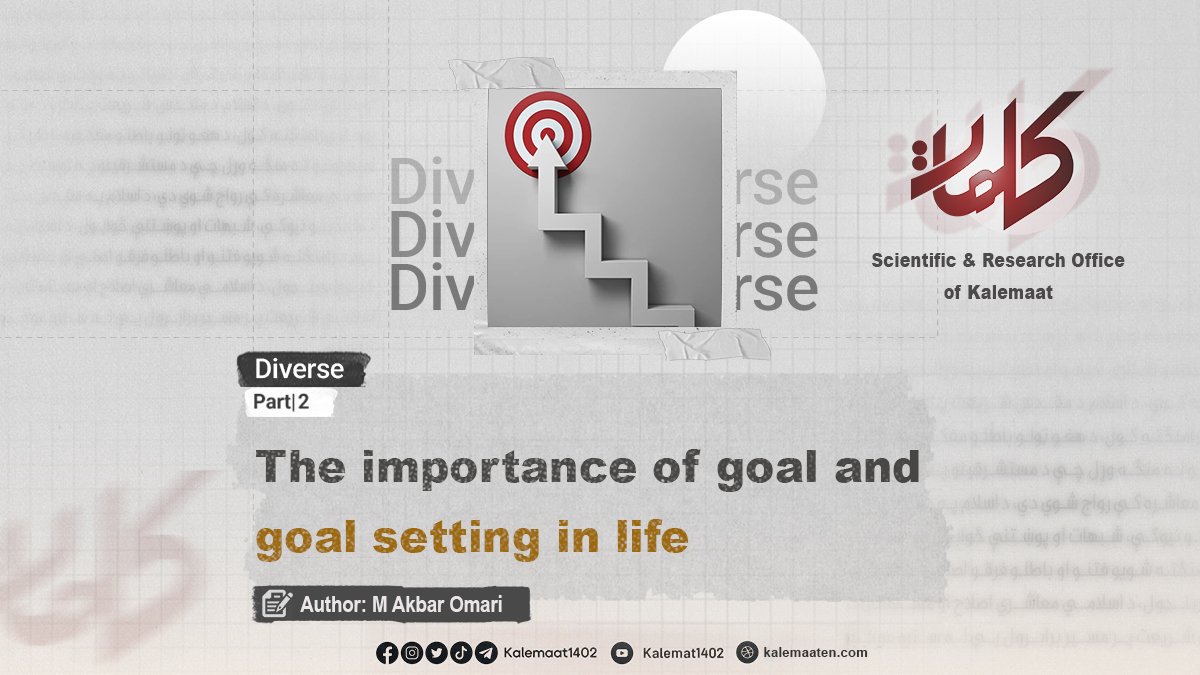Author: M. Akbar Omari
The importance of goal and goal setting in life (Part two)
In the first part of this article, we discussed the nature of purpose and shared valuable insights surrounding it. In this section, we examine the importance of purpose and its constructive role in human life.
Without a doubt, setting goals plays a key role in creating motivation and direction in life. Those who have clear objectives move toward success with greater determination and energy, while avoiding useless activities and time-wasting distractions. Goal-setting not only means having a specific plan for the future, but it also allows us to make better use of our lives and prevents future regret and disappointment.
The Impact of Goal-Setting in Life
Having a purpose in life brings numerous benefits, including the following:
-
Increased motivation and hope for life: Clear goals give a person stronger drive for effort and progress.
-
Purposeful daily activities: With goals in place, everyday actions are guided toward achieving them.
-
Self-confidence: Achieving goals enhances confidence and self-belief.
-
A sense of movement and energy: Setting goals provides individuals with a feeling of momentum and vitality, leading them toward positive action.
-
Higher productivity: Goal-oriented individuals are generally more efficient and productive in their work.
-
Hope for a brighter future: Goal-setting inspires optimism and motivation for advancement.
-
Strengthened determination and perseverance: Striving for goals builds willpower and persistence.
-
Greater risk-taking ability: People with clear goals are more willing to take on new challenges and risks.
-
Freedom from blind imitation: Having purpose keeps one from thoughtlessly following others or losing direction in life.
Thus, goal-setting not only improves the quality of one’s life but also guides a person toward greater and more sustainable success.
The Reason and Method of Goal-Setting
Many individuals struggle with setting goals. These challenges may include lack of desire, low motivation, fear of failure, social pressure, or self-doubt. To overcome these obstacles and set meaningful goals, one should:
-
Define clear and specific goals: Have a vivid picture of what you want to achieve.
-
Plan effectively: Success requires precise and well-organized planning.
-
Start from childhood: Teaching children the importance of goal-setting from an early age helps develop a positive attitude toward life’s objectives.
Islam’s Response to Fundamental Existential Questions
Islam answers the essential existential questions and clarifies the purpose of creation. Reflecting on the meaning of life and its goals can provide valuable guidance. The Holy Qur’an — the divine book of Muslims — offers clear answers to these fundamental questions:
Where did we come from?
The Qur’an states: «وَاللَّهُ خَلَقَكُمْ مِنْ تُرَابٍ ثُمَّ مِنْ نُطْفَةٍ» [Surah Faṭir: 11] “And Allah created you from dust, then from a drop of fluid.”
Why have we come?
The answer is given in the Qur’an: «وَمَا خَلَقْتُ الْجِنَّ وَالْإِنسَ إِلَّا لِيَعْبُدُونِ» [Surah adh-Dhariyāt: 56] “And I did not create jinn and mankind except to worship Me.”
Where are we going?
The Qur’an says: «مِنْهَا خَلَقْنَاكُمْ وَفِيهَا نُعِيدُكُمْ وَمِنْهَا نُخْرِجُكُمْ تَارَةً أُخْرَىٰ» [Surah Ṭāhā: 55] “From the earth We created you, and into it We will return you, and from it We will bring you forth once again.”
Reasons for the Difficulty in Setting Goals
Various obstacles may stand in the way of defining one’s goals, including:
-
Lack of strong desire: Without a deep longing to achieve something specific, goal-setting becomes difficult.
-
Low motivation: A lack of motivation hinders the ability to set goals and pursue them.
-
Fear of failure: The fear of not succeeding can prevent individuals from setting or striving toward goals.
-
Social pressures: External expectations can cause confusion about what one truly wants.
-
Self-doubt: Doubting one’s abilities and worth can make defining goals challenging.
Beginning the Journey Toward Achievement
One of the most crucial steps toward success is defining goals clearly and precisely. You must know explicitly what you want from life. When you have a clear answer to this question, your path to achievement becomes far more distinct.
As Goethe says: “Everything is hard before it becomes easy.”
How to Achieve Your Goals?
To reach your objectives, a well-structured plan is essential. Planning not only enables you to overcome obstacles but also helps you solve many of life’s challenges and difficulties.
The Benefits of Planning in Achieving Goals
Effective planning leads to the achievement of numerous outcomes, such as:
-
Greater focus and deeper understanding of objectives;
-
Better stress management and reduced anxiety;
-
Higher chances of success and goal attainment;
-
Strengthened creativity and innovation;
-
Improved time management and productivity;
-
Enhanced happiness and life satisfaction;
-
Increased mindfulness and presence of mind;
-
Better decision-making processes;
-
Reduced confusion and ambiguity;
-
Prevention of time wastage;
-
Decreased human error and mistakes.



